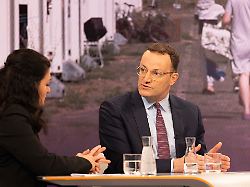Refugee talk near Illner
Spahn: “We can’t do it anymore”
By Marko Schlichting
September 22, 2023, 5:36 a.m
Listen to article
This audio version was artificially generated. More info | Send feedback
Very few refugees make it to Europe, yet the camps at the external borders are overcrowded. In Germany, many municipalities see themselves at the limit of their capacity. Agreements with third countries are urgently needed, says migration researcher Koopmans at Maybrit Illner.
The Union parties have offered the traffic light coalition a Germany pact to deal with the refugee crisis. At the request of the Union, the Bundestag should now discuss it. The topic caused a passionate discussion with Maybrit Illner on ZDF.
The fact is: Germany needs immigration. But there are currently too many refugees coming, the municipalities in Germany have been warning for nine months. Federal President Frank-Walter Steinmeier also stated that Germany was at its limit.
The entry of refugees who want to apply for asylum is actually supposed to be regulated by the Dublin Convention. According to this, every foreigner who applies for asylum in the territory of the contracting states is guaranteed an appropriate procedure. This agreement came into force in 1997. It is still valid under international law, but is now overshadowed by European law.
Agreements with third countries
Ruud Koopmans is a migration researcher and professor at the Humboldt University in Berlin. He explains: “The agreement was created at a time when there were still internal borders in Europe. We no longer have those. That’s why it no longer works. Dublin is dead, and has been for a very long time.” So new legal regulations urgently need to be created. Koopmans criticizes: “Not only is there no German solution to the refugee problem, there is also no European solution.” The interior ministers of the EU states have agreed on a new refugee law, but this must first be examined and decided by the EU Parliament. That will take a very long time, says Koopmans. He suggests: “We have to conclude agreements with third countries. That is the only way to get control over irregular migration.”
In concrete terms, this means: Migrants seeking asylum in Europe would have to submit the corresponding application in a country outside the EU and wait for the decision there. The EU interior ministers have also decided this. EU Council President Ursula von der Leyen and Italian Prime Minister Giorgia Meloni have now held initial talks with Tunisia. Not a good idea, says migration researcher Christopher Hein: “The rush by von der Leyen and the other politicians has achieved nothing. And with a government that is increasingly a dictatorial government and has no interest in entering into cooperation with the EU or individual states , there is no point in making such agreements.”
Koopmans sees it a little differently. He calls for the attractiveness of agreements with countries like Tunisia to be increased by making it easier for migrants from there to enter the EU. However, Koopmans also suggests negotiations with other possible third countries such as Albania, Moldova or Ghana.
Spahn: “We have a part-time interior minister”
These proposals will not help the people of the Italian island of Lampedusa. Germany will not accept any of the refugees currently living there under the most difficult conditions, says Interior Minister Nancy Faeser at Maybrit Illner.
As far as solving the current refugee crisis is concerned, CDU politician Jens Spahn acknowledges: “Something is happening. There is more and more awareness that we have limits to what is possible everywhere. We can no longer do it.” A first right step would be if all democratic politicians agreed on this. “That seems to be happening to me.” Now it’s all about national agreements to curb illegal migration. To this end, the question of safe countries of origin must be clarified in order to make it easier to return rejected asylum seekers.
At the same time, it is also about border controls or benefits in kind instead of cash for refugees living illegally in Germany. In addition, a European solution must be found, which includes secure EU external borders. Spahn has doubts about the work of the Interior Minister, who is also the Hesse SPD’s top candidate in the state elections taking place on October 8th. “We have a part-time interior minister,” he criticizes.
Germany pact on migration
“We have accelerated the asylum process,” answers Faeser. She was abroad, negotiated with third countries and worked on a new European asylum procedure. Spahn’s claims are not true. He goes one better: “We have fewer deportations. They have even created residence regulations for people who have deceived their identity. They want to increase the citizen’s allowance.” At the European level the traffic lights are divided.
At the Bundestag debate on Friday, the Union wanted to offer Chancellor Olaf Scholz a Germany pact in the migration debate. “We are ready to make a decision in the democratic center,” says Spahn – and suggests that corresponding laws could be passed as early as next week.
Faeser is open to such a pact. She promises that she will present a suitable bill to the Bundestag. “The Chancellor has taken a first step towards you with his idea for a pact with Germany. I would be pleased if you would accept your outstretched hand on this matter,” said the minister.
